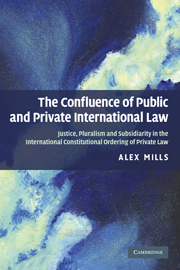 The Confluence of Public and Private International Law
The Confluence of Public and Private International Law Book contents
- Frontmatter
- Contents
- Acknowledgments
- Index of cases, judicial opinions and arbitral awards
- Abbreviations
- 1 Justice, pluralism and the international perspective
- 2 The private history of international law
- 3 From positivism to constitutionalism
- 4 Private international law and constitutional law in federal systems
- 5 The confluence of public and private international law
- 6 Conclusions
- Bibliography
- Index
3 - From positivism to constitutionalism
Published online by Cambridge University Press: 20 January 2010
- Frontmatter
- Contents
- Acknowledgments
- Index of cases, judicial opinions and arbitral awards
- Abbreviations
- 1 Justice, pluralism and the international perspective
- 2 The private history of international law
- 3 From positivism to constitutionalism
- 4 Private international law and constitutional law in federal systems
- 5 The confluence of public and private international law
- 6 Conclusions
- Bibliography
- Index
Summary
Introduction
This Chapter explores the progress of international law and legal theory beyond the history examined in Chapter 2. Throughout that history, theories of private international law have both reflected and reinforced the development of different conceptions of the international system, different sets of international norms. The present idea of private international law as discretionary national law is based on positivist international law theory, which demands a strict formal separation of international and national law. In the past, this theory has competed with other ideas which have suggested different understandings of private international law. However, for reasons which are explored in Chapter 2, the idea of private international law as discretionary national law, an expression of state sovereignty, is self-perpetuating. The dominant theories of private international law therefore continue to reflect and replicate the positivist norms of the late nineteenth century, projecting the view of the international system as an arena of conflict between individualistic state actors.
This Chapter argues that the approach offered by international positivism is fundamentally flawed. It examines developments in international law that implicitly reject the conception popularised by international legal positivism, and point to the emergence of new international norms and a breakdown of the strict formal distinction between international and national law. The critiques of positivist international law in this Chapter thus undermine the theoretical foundations of contemporary private international law, and suggest a new foundation for rethinking the relationship between public and private international law.
- Type
- Chapter
- Information
- The Confluence of Public and Private International LawJustice, Pluralism and Subsidiarity in the International Constitutional Ordering of Private Law, pp. 74 - 114Publisher: Cambridge University PressPrint publication year: 2009


